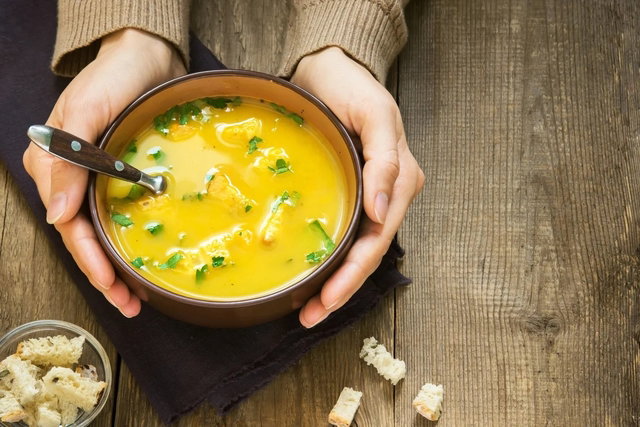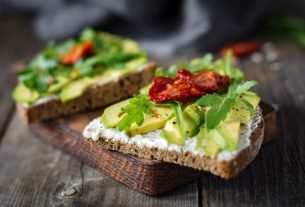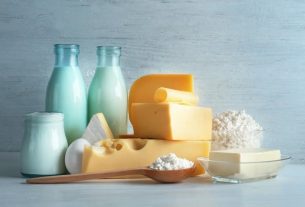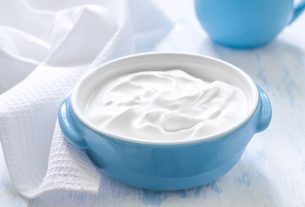During food poisoning, it is important to prioritize easily digestible foods, such as white rice, white bread, soups, peeled and cooked fruits and vegetables, which have little fiber and fat, helping to recover from this condition.
Furthermore, during poisoning it is important to avoid foods with fiber that are difficult to digest, such as unpeeled fruits and vegetables, brown rice and raw leafy vegetables, as well as foods with a lot of fat and sugar, such as ice cream, cheese and sweets, as these foods stimulate bowel movements.
Food poisoning is a situation that can occur after eating food contaminated by toxins, produced by bacteria and fungi, causing symptoms such as stomach pain, vomiting and diarrhea. Learn about other symptoms of food poisoning.

Foods that should be prioritized
Foods recommended during food poisoning should be low in fiber and fat, to help control diarrhea and relieve stomach pain, including:
- Peeled and cooked fruits, such as apple, pear, green banana, peach;
- Peeled and cooked vegetables, such as carrots, chayote, zucchini and eggplant;
- Tubers, such as cassava, potatoes, yams and yams;
- lean proteins, such as skinless chicken or turkey, white fish such as hake and sea bass and tofu;
- Cereals with little fiber, such as white rice, toast, white pasta and white bread;
- Vegetable oils, in small quantities, such as olive oil, avocado oil and linseed oil;
- Vegetable drinks, such as rice milk and soy milk.
It is also recommended to drink plenty of fluids throughout the day, in small portions, such as water and coconut water to avoid dehydration. Some sugar-free teas, such as chamomile and ginger, can also be consumed, as they have antispasmodic and antiemetic properties, relieving nausea, diarrhea and vomiting. Discover some teas that relieve nausea and vomiting.
It is also recommended to divide your meals to avoid nausea and vomiting, eating 5 to 6 meals in small volumes throughout the day.
What to eat in cases of vomiting
In case of vomiting, you should avoid eating or drinking, letting your stomach rest for an hour, and then trying to drink small amounts of water little by little. When tolerating water well, you can try to consume small volumes of food.
Menu for food poisoning
The following table contains an example menu for 3 days for food poisoning:
This menu is just a model, which may vary according to each person’s health status and preferences. Therefore, it is advisable to have a consultation with a nutritionist to assess nutritional needs and health status, planning an individual diet.
See the video below for some tips on what to eat to alleviate diarrhea, one of the symptoms of food poisoning:
What to eat after poisoning
After food poisoning, it is essential to gradually return to a healthy and balanced diet, including other types of foods in the diet, such as legumes, unpeeled fruits, raw vegetables and low-fat dairy products, to prevent deficiencies in important nutrients for health. health. See how to eat a healthy and balanced diet.
Foods that should be avoided
It is important to avoid foods rich in fiber, fats and sugar, as they make digestion difficult and irritate the stomach and intestines, which can cause nausea and stimulate bowel movements. Therefore, the foods that should be avoided during food poisoning are:
- Foods rich in fat, such as ice cream, fried foods, hamburgers and fries;
- Whole grains, such as brown rice, whole-grain pasta, whole-grain bread, and oats
- Unpeeled and raw fruits, such as apples with skins, pears with skins, and peaches with skins;
- leafy vegetables, such as lettuce, chard, chicory, arugula, spinach and bertalha;
- Foods rich in sugar, such as ice cream, cakes, chocolates, sweets and soft drinks;
- Dairy, such as milk, yogurt, cheese and butter;
- fatty meats, such as beef, pork, lamb and duck;
- Caffeinated drinks, such as coffee, black tea and mate tea;
- condiments, such as pepper, curry, paprika and cumin;
- Built-ins, such as ham, sausage, salami and mortadella.
Furthermore, it is recommended to avoid consuming beans, radishes, cabbage, lentils and sweet potatoes, as they can increase gas production, causing discomfort.
When to take medicine
The use of medicines is generally not recommended to treat food poisoning, because symptoms improve with adequate nutrition and fluid intake. Furthermore, the use of medicines to stop diarrhea is not recommended, as they can interfere with the elimination of toxins through feces, worsening the symptoms of intoxication.
However, when symptoms do not improve within a few days or worsen, the gastroenterologist may recommend the use of analgesics and antibiotics to improve pain and combat intoxication. See the remedies recommended for food poisoning.
In addition, the doctor may also recommend the use of probiotic supplements in the form of capsules, liquids or sachets, which are beneficial bacteria that help balance the intestinal flora and fight “bad” bacteria in the intestine. Check out some types of probiotics.
Bibliography
- NHS. Infections and poisoning: Food poisoning. Disponível em: <https://www.nhsinform.scot/illnesses-and-conditions/infections-and-poisoning/food-poisoning#treating-food-poisoning>. Acesso em 07 jul 2022
- CLEVELAND CLINIC. Disease and Conditions: food poisoning. Disponível em: <https://my.clevelandclinic.org/health/diseases/21167-food-poisoning#management-and-treatment>. Acesso em 07 jul 2022
- WORLD GASTROENTEROLOGY ORGANISATION. Acute diarrhea in adults and children: a global perspective . 2012. Available at: <https://www.worldgastroenterology.org/UserFiles/file/guidelines/acute-diarrhea-portuguese-2012.pdf>. Accessed on 7 Jul 2022

Sign up for our newsletter and stay up to date with exclusive news
that can transform your routine!
Warning: Undefined array key "title" in /home/storelat/public_html/wp-content/plugins/link-whisper-premium/templates/frontend/related-posts.php on line 12
Warning: Undefined array key "title_tag" in /home/storelat/public_html/wp-content/plugins/link-whisper-premium/templates/frontend/related-posts.php on line 13




